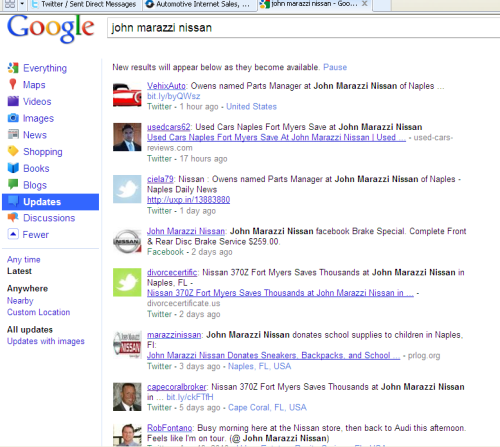Since Google began testing “Realtime Search,” we have seen several incarnations including a scrolling area on the main search page. With the announcement last week of the new “Realtime Search,” I found a renewed interest in the possibilities of another strong source of SEO. What I discovered left me scratching my head and consequently consumed a larger part of my morning than I had to spare. My SEO and content was being hijacked!
What I found on the “Realtime Search” updates page was a list of threads all from Twitter. Some I recognized, but some were a bit disturbing. We use a lot of video at our dealerships and I have known for a long time that our online video content was being scraped for use on other non-related sites. It never really bothered me because even though the sites using it had their own agenda, they were generally rogue video sites that appeared to be harmless. Besides, the video was there and the headline was the same, so it added to our SERP.
What I discovered after drilling down into the “Realtime Search” results was that the parties that are scraping our videos are also tweeting the video titles on their own Twitter accounts. After further examination, I found that the hijackers were also using press release titles.

Twitter accounts like “ciela79” reveal a collection of random tweets resembling the bar scene from “Total Recall.” Here you see a Tweets using Amazon.com and a Seattle Nissan Dealers PRLog press release title. Every tweet on the page includes a tinyurl that leads to a banner ad rich site called Askbiography.com. There, they use an excerpt from the press release or video description. I imagine that the bounce rate must be astronomical, but I am also sure that they are getting click throughs or they wouldn’t go through all this trouble.

Other Twitter accounts like use-car-reviews.com and divorcecertificate.us (or how to catch your mate cheating) were tweeting titles to our video and press release headlines and including a link to their own sites. These sites are essentially pirating our SEO Content efforts by using already optimized content to lead search results to their own banner ad crammed sites.
This method of “SEO Piracy” is creating the very real possibility that your customers’ search results could lead them to a site that not only isn’t yours, but could contain any type of content. Let’s face it, the average person doesn’t understand how Google works; they just know that it does.
So has the combination of Twitter and Google “Realtime Search” made it easier for these “SEO Pirates” to use your optimized content to steal search results?
If so, what can be done about it?
It appears the same type of people that turned MySpace into a cesspool and attempt link building on our blogs have found a new venue to exploit. We all know that in search, content is king. Now it appears that the king had better keep an eye on his gold.
Any thoughts?







